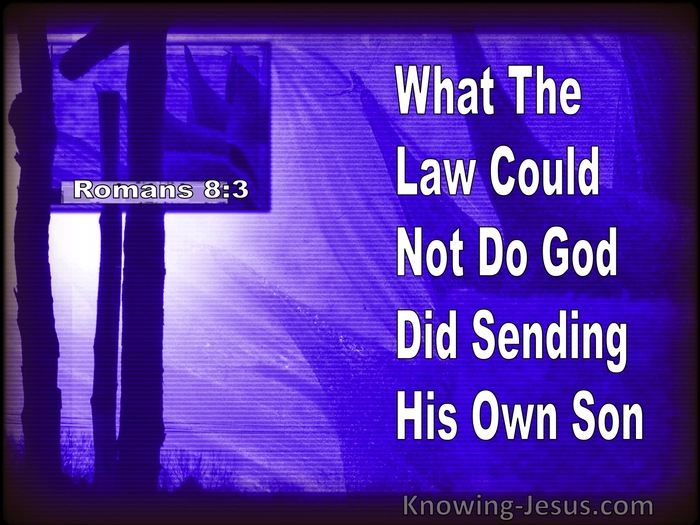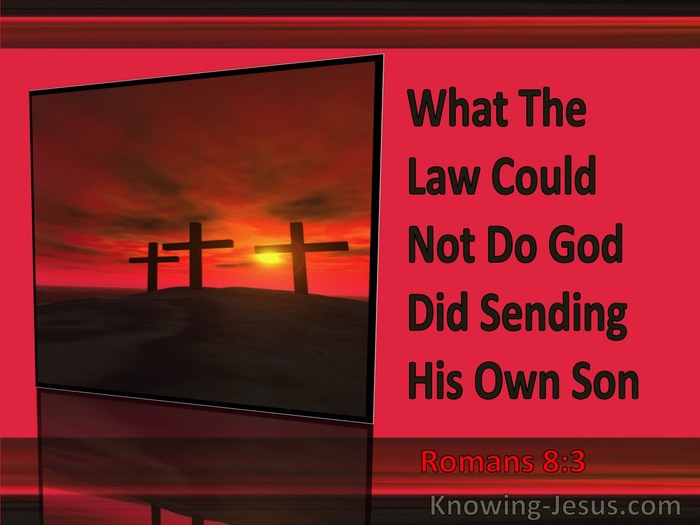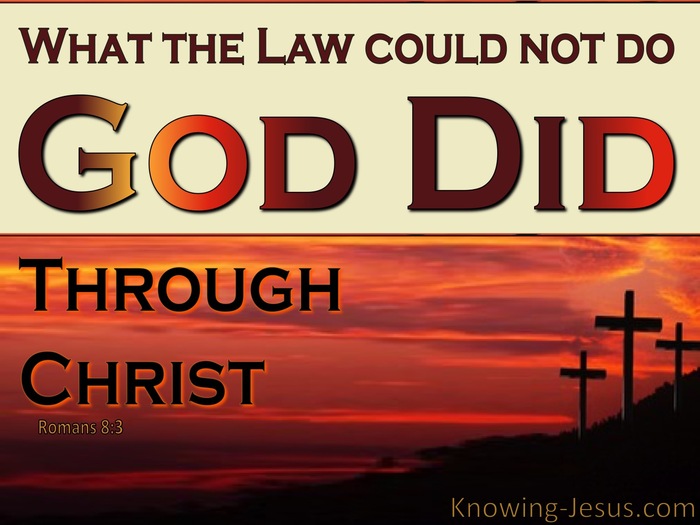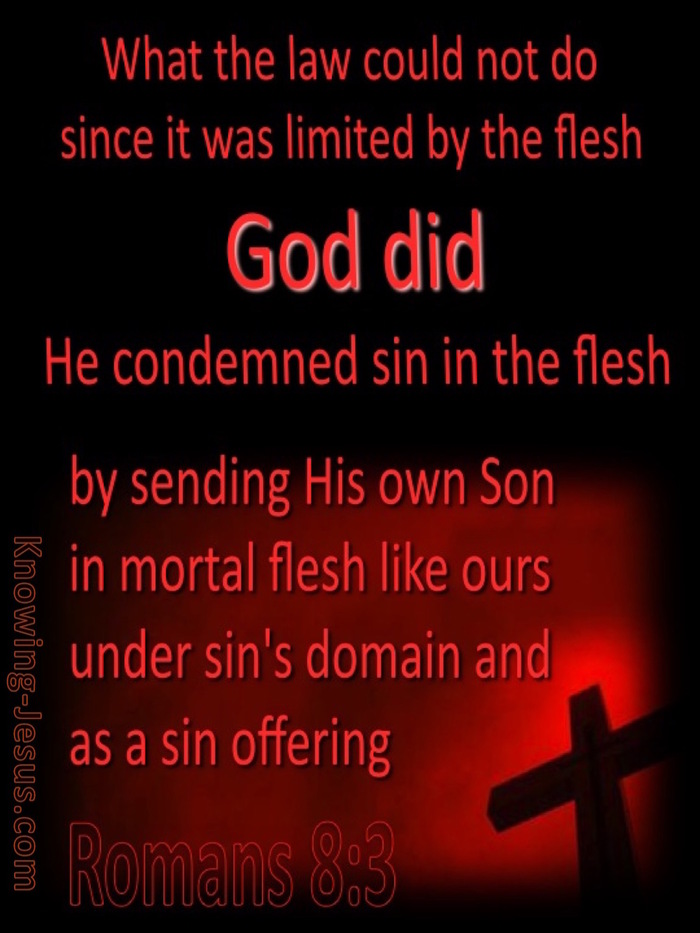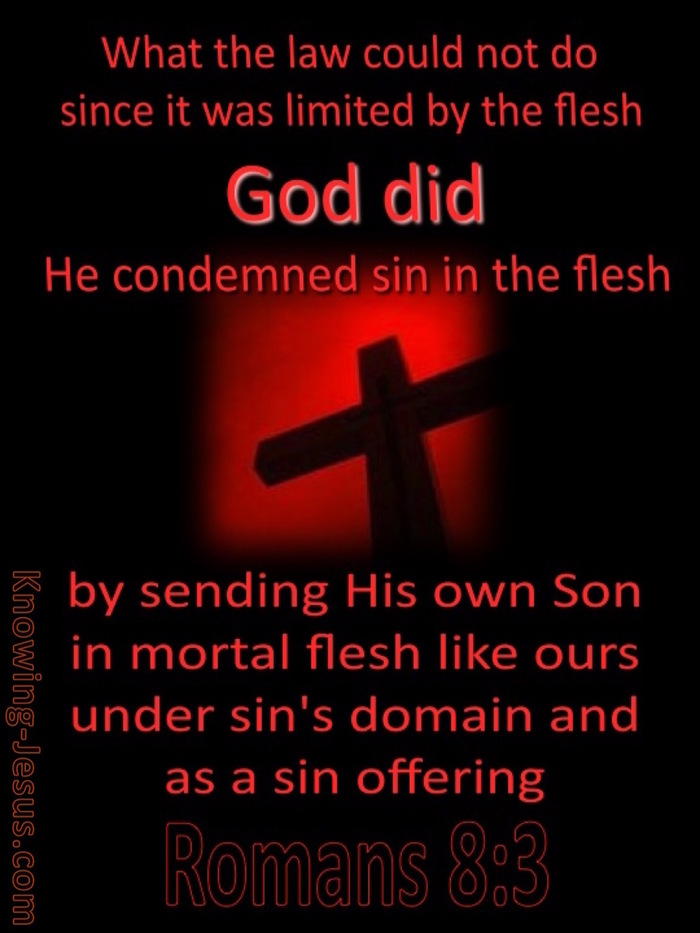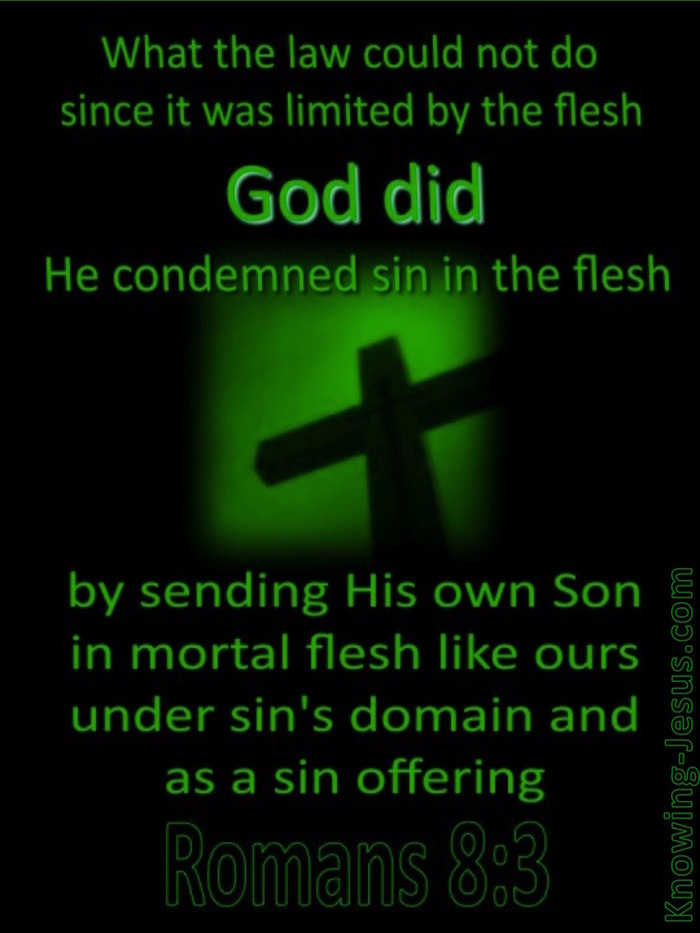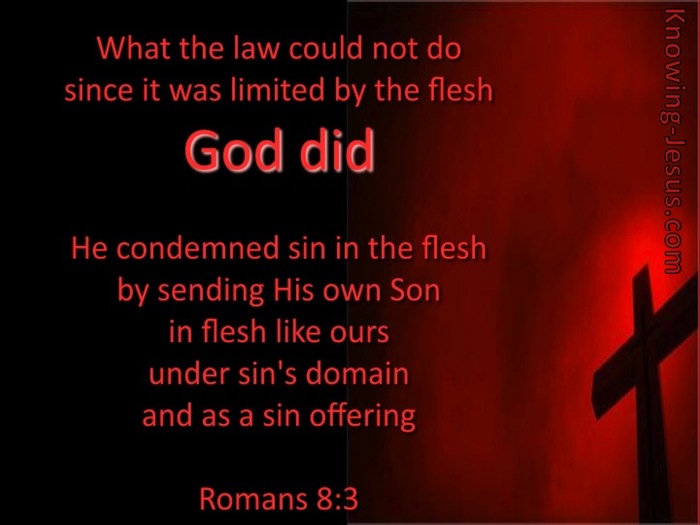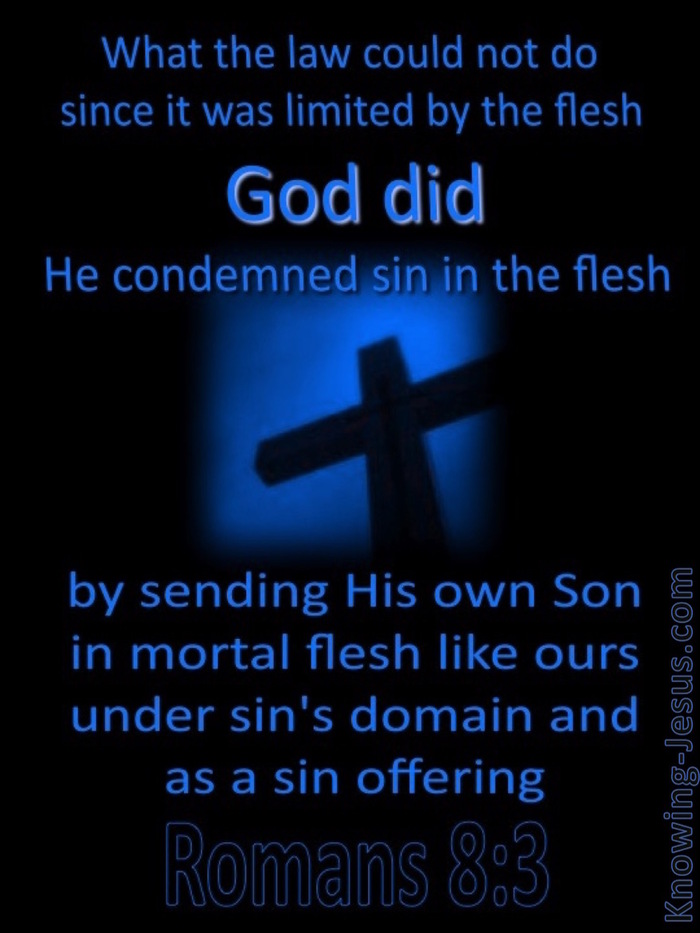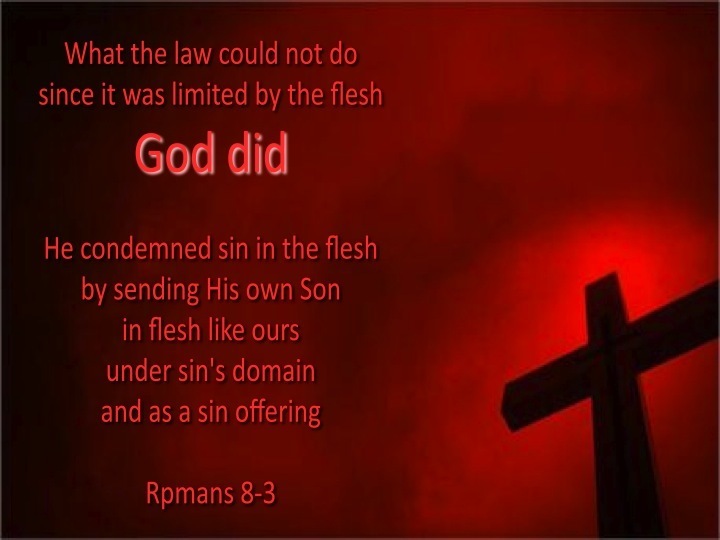Parallel Verses
An Understandable Version
For what the law was not able to do [for mankind], since it was [too] weak [to deliver them from condemnation] because fleshly people [were unable to obey it perfectly], God condemned sin in the flesh [i.e., sin was declared evil and its power over man broken]. God did this by sending His own Son in a body like sinful man's, and to destroy sin,
New American Standard Bible
For
King James Version
For what the law could not do, in that it was weak through the flesh, God sending his own Son in the likeness of sinful flesh, and for sin, condemned sin in the flesh:
Holman Bible
What the law could not do
International Standard Version
For what the Law was powerless to do in that it was weakened by the flesh, God did. By sending his own Son in the form of humanity, he condemned sin by being incarnate,
A Conservative Version
For the impotence of the law, in that it was weak because of the flesh, God, having sent his own Son in a form of flesh of sin, and concerning sin, condemned sin in the flesh,
American Standard Version
For what the law could not do, in that it was weak through the flesh, God, sending his own Son in the likeness of sinful flesh and for sin, condemned sin in the flesh:
Amplified
For what the Law could not do [that is, overcome sin and remove its penalty, its power] being weakened by the flesh [man’s nature without the Holy Spirit], God did: He sent His own Son in the likeness of sinful man as an offering for sin. And He condemned sin in the flesh [subdued it and overcame it in the person of His own Son],
Anderson New Testament
For what the law could not do, because it was weak through the flesh, God has done, who, sending his own son in the likeness of sinful flesh, and for a sin-offering, condemned sin in the flesh,
Bible in Basic English
For what the law was not able to do because it was feeble through the flesh, God, sending his Son in the image of the evil flesh, and as an offering for sin, gave his decision against sin in the flesh:
Common New Testament
For what the law could not do, in that it was weakened through the flesh, God did by sending his own Son in the likeness of sinful flesh, and for sin: he condemned sin in the flesh,
Daniel Mace New Testament
God having sent his own son invested with a body like that of sinful men, as a sacrifice for sin, thereby destroyed its power; which the law could not effect, human nature being in such a corrupted state.
Darby Translation
For what the law could not do, in that it was weak through the flesh, God, having sent his own Son, in likeness of flesh of sin, and for sin, has condemned sin in the flesh,
Godbey New Testament
For there was an impotency of the law, in which it was weak through depravity, God having sent his own Son in the likeness of the sin of depravity and for sin, condemned sin in depravity:
Goodspeed New Testament
For though it was impossible for the Law to do it, hampered as it was by our physical limitations, God, by sending his own Son in our sinful physical form, as a sin-offering, put his condemnation upon sin through his physical nature,
John Wesley New Testament
For what the law could not do, in that it was weak through the flesh, God hath done: sending his own Son in the likeness of sinful flesh, to be a sacrifice for sin, he hath condemned sin in the flesh:
Julia Smith Translation
For the impossibility of the law, in that it was weak by the flesh, God having sent his own Son in the likeness of the flesh of sin, and for sin, condemned sin in the flesh:
King James 2000
For what the law could not do, in that it was weak through the flesh, God sending his own Son in the likeness of sinful flesh, and for sin, condemned sin in the flesh:
Lexham Expanded Bible
For what [was] impossible for the law, in that it was weak through the flesh, God [did]. [By] sending his own Son in the likeness of sinful flesh and concerning sin, he condemned sin in the flesh,
Modern King James verseion
For what the law could not do, in that it was weak through the flesh, God sending his own Son in the likeness of sinful flesh, and for sin, condemned sin in the flesh;
Modern Spelling Tyndale-Coverdale
For what the law could not do, inasmuch as it was weak because of the flesh - that performed God, and sent his son in the similitude of sinful flesh, and by sin damned sin in the flesh;
Moffatt New Testament
For God has done what the Law, weakened here by the flesh, could not do; by sending his own Son in the guise of sinful flesh, to deal with sin, he condemned sin in the flesh,
Montgomery New Testament
For God has done what the Law could not do, weakened as it was by flesh. By sending his own Son in the likeness of sinful flesh, and on account of sin, he condemned sin in the flesh;
NET Bible
For God achieved what the law could not do because it was weakened through the flesh. By sending his own Son in the likeness of sinful flesh and concerning sin, he condemned sin in the flesh,
New Heart English Bible
For what the law could not do, in that it was weak through the flesh, God did, sending his own Son in the likeness of sinful flesh and for sin, he condemned sin in the flesh;
Noyes New Testament
For what the Law could not do, in that it was weak through the flesh, God hath done, who on account of sin sent his own Son in the likeness of sinful flesh, and passed sentence of condemnation on sin in the flesh;
Sawyer New Testament
For what the law could not do because it was weak through the flesh, God having sent his Son in the likeness of sinful flesh, and for sin, condemned the sin in the flesh,
The Emphasized Bible
For, what was impossible by the law in that it was weak through the flesh, God, by sending his own Son in the likeness of sinful flesh and concerning sin, condemned sin in the flesh,
Thomas Haweis New Testament
For that which was impossible by the law, inasmuch as it was impotent through the flesh, God having sent his own Son in the likeness of sinful flesh, and for sin, condemned sin in that flesh:
Twentieth Century New Testament
What Law could not do, in so far as our earthly nature weakened its action, God did, by sending his own Son, with a nature resembling our sinful nature, to atone for sin. He condemned sin in that earthly nature,
Webster
For what the law could not do, in that it was weak through the flesh, God, sending his own Son in the likeness of sinful flesh, and for sin, condemned sin in the flesh:
Weymouth New Testament
For what was impossible to the Law--powerless as it was because it acted through frail humanity--God effected. Sending His own Son in a body like that of sinful human nature and as a sacrifice for sin, He pronounced sentence upon sin in human nature;
Williams New Testament
For though the law could not do it, because it was made helpless through our lower nature, yet God, by sending His own Son in a body similar to that of our lower nature, and as a sacrifice for sin, passed sentence upon sin through His body,
World English Bible
For what the law couldn't do, in that it was weak through the flesh, God did, sending his own Son in the likeness of sinful flesh and for sin, he condemned sin in the flesh;
Worrell New Testament
For, what was impossible under law, wherein it was weak through the flesh. God, sending His Own Son in likeness of sinful flesh, and, respecting sin, condemned sin in the flesh;
Worsley New Testament
For that which was impossible for the law to do, and in which it was weak through the corruption of the flesh, God by sending his own Son in the likeness of sinful flesh to be a sacrifice for sin, hath done; that is, hath condemned sin in the flesh:
Youngs Literal Translation
for what the law was not able to do, in that it was weak through the flesh, God, His own Son having sent in the likeness of sinful flesh, and for sin, did condemn the sin in the flesh,
Themes
The atonement » Has delivered saints from the » Power of sin
Condemnation » Jesus Christ condemning sin
death » What frees you from death
Holy spirit » Those that follow after the spirit
Justification before God » Under the gospel » Is not of works
Law » Christ being the end of the law
Law » Bondage of » Insufficient
Law » Who has fulfilled the law
the Law of moses » Could not give righteousness and life
the Law of moses » Was not the manifestation of the grace of God
Interlinear
En
ἐν
En
ἐν
En
in, by, with, among, at, on, through,
in, by, with, among, at, on, through,
Usage: 2128
Usage: 2128
Astheneo
Dia
heautou
Peri
Hamartia
ἁμαρτία
Hamartia
Usage: 143
Devotionals
Devotionals about Romans 8:3
Devotionals containing Romans 8:3
References
Hastings
Morish
Word Count of 37 Translations in Romans 8:3
Prayers for Romans 8:3
Verse Info
Context Readings
Set Free From The Law Of Sin And Death
2 For the Holy Spirit's law which provides [never ending] life for those in [fellowship with] Christ Jesus has freed me from the law that requires [spiritual] death for sinning. 3 For what the law was not able to do [for mankind], since it was [too] weak [to deliver them from condemnation] because fleshly people [were unable to obey it perfectly], God condemned sin in the flesh [i.e., sin was declared evil and its power over man broken]. God did this by sending His own Son in a body like sinful man's, and to destroy sin, 4 so that the requirements of the law could be [considered] fulfilled in us, who do not live according to [the dictates of] the flesh, but according to [the promptings of] the Holy Spirit.
Names
Cross References
Acts 13:39
and [it is] by Him that every believer is made right with God in every way that he could not have been made right by [observing the requirements of] the law of Moses.
2 Corinthians 5:21
God considered Christ to be sinful on our behalf, even though He never sinned, so that we could be considered right with God through Him.
Hebrews 10:14
For by one offering [i.e., the sacrifice of Himself], Christ has made perfect forever those people who are being set apart for God.
Philippians 2:7
Instead, He gave up what He had and took on the form [i.e., the nature] of a slave, becoming like a man, [and even] His appearance was found to be like a man's.
Hebrews 10:1-10
For the law of Moses was [only] a foreshadow of the good things that [were] to come [i.e., in the Messianic age], not the exact image of those things. It can never, by the same sacrifices, continually offered year after year, make [morally] perfect those who draw near [to God in worship].
Mark 15:27
And they also crucified two thieves with Him, one at His right side and one at His left. {{Some ancient manuscripts add verse
John 1:14
[Eventually] this Word became a human being and lived among us [Note: The word "lived" here refers to pitching a temporary tent]. (And we saw His splendor; such splendor as belongs to the Father's only Son), full of God's favor and truth.
John 3:14-17
And [just] like Moses lifted up the snake [on the pole] in the wilderness [Num. 21:9], so the Son of man must be lifted up [on the cross]
John 9:24
So, they called the [former] blind man a second time, and said to him, "Give honor to God [Note: In Jewish idiom this phrase meant "Tell the truth." See Josh. 7:19]; we know this man is a sinner."
Romans 3:20
This is because no human being can be considered right with God by [obeying] the requirements of a law. [Note: It is difficult to determine the exact sense in which "law" is used in these verses. It may be law generally, or the law of Moses specifically. See Bruce, pages 52-58]. For the knowledge of what sin is comes from the law of Moses.
Romans 6:6
We know that our old self was [figuratively] crucified with Christ, in order that the body of sin [i.e., our whole life of sin] might be destroyed [i.e., become powerless to control our actions and thoughts], so that we should not be enslaved to the practice of sin any longer.
Romans 7:5-11
For when we were in the flesh [i.e., before conversion], our sinful desires, aroused by [the restrictions of] the law of Moses, worked in our bodies to produce activity that led to [spiritual] death.
Romans 8:32
God did not withhold His own Son [from dying], but offered Him up for all of us. [Since He did that], will He not, along with Jesus, freely give us everything [else] also?
Romans 9:3
For I could wish that I, personally, were cut off from Christ [and lost] for the sake of my brothers, who are my physical relatives,
Galatians 3:13
Christ bought us back from the curse [caused by our not obeying all the requirements] of the law of Moses; He became a curse for us [by dying on the cross], for it is written [Deut. 21:23], "Every one who hangs on a tree [i.e., a cross] is cursed [i.e., cut off from God]."
Galatians 3:21
Is the law of Moses contrary to the promises of God? Certainly not! For if there had been a law given which could provide [never ending] life, then a person could be considered right with God by [obeying the requirements of such] a law.
Galatians 4:4-5
But, when [God's] timing fully arrived, He sent His Son, born to a woman [i.e., Mary], born during [the time when] the law [of Moses was still in effect],
Hebrews 2:14
Therefore, since the children share in [bodies of] flesh and blood, Christ also, in the same way, took on a human body so that, through His death, He could destroy [the dominion of] him who had the power to cause death, that is, the devil.
Hebrews 2:17
So, for this reason, He had to become like His brothers in every way [i.e., except that He never sinned], so that He could become a merciful and faithful Head Priest in things related to God's [service], [and] that He could provide a means of purifying [Lev. 16:30] for people's sins [i.e., make atonement for them].
Hebrews 4:15
For we do not have a head priest who is incapable of sympathizing with our weaknesses, but One [i.e., Jesus] who has been tempted in every way that we have, and yet without sinning.
Hebrews 7:18-19
For on one hand, the previous command [i.e., the law of Moses] was set aside because it was weak and useless,
Hebrews 10:12
But when this Priest [i.e., Christ] had offered one sacrifice for sins for all time, He sat down at the right side of God.
1 Peter 2:24
Jesus took upon Himself our sins [when] His body was placed upon the cross so that we, [through] dying to [i.e., giving up] the sinful life, would live for righteousness. You were healed [from your sins] by His being brutally treated.
1 Peter 4:1-2
Therefore, since Christ has suffered physically, you people should fortify yourselves with the same attitude He had. For the person who has suffered physically [i.e., in standing for Christ] has quit sinning.
1 John 4:10-14
Here is [the essence of] love: [It is] not that we loved God [first], but that He loved us [See Rom. 5:6-8] and sent His Son to be a "covering over" [i.e., atonement, 2:2] for our sins.
